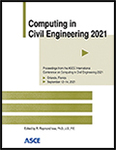Data-Driven Simulation of Room-Level Building Energy Consumption
Publication: Computing in Civil Engineering 2021
ABSTRACT
Building energy consumption comprises a highly complex set of dynamics that critically depend on the behavior of building occupants. A key area of ongoing research is the simulation of energy consumption for evaluation of occupant-centric building design or management interventions (e.g., building layouts, suggestions to occupants). Researchers have shown that standard physics-based simulation tools like EnergyPlus exhibit large errors when compared to measured data, which has largely been attributed to difficulties in handling occupancy data. To address this performance gap, scholars have noted the promise of data-driven simulation tools. However, a key remaining challenge is the integration of granular (e.g., zone- or room-level) occupancy data for prediction of energy consumption at these granular scales. Such analysis can enable rapid simulation of the effects of new building states (e.g., occupancy patterns) for evaluation of potential building interventions (e.g., schedule-shifting). In this paper, we use real-time data from ambient sensors in a test bed and train a data-driven model to predict HVAC energy consumption using occupancy, temperature, humidity, and temporal features, each collected with high spatial and temporal granularity. We find that our data-driven approach outperforms EnergyPlus, even when adjusted with calibration tools [CV(RMSE) improvement of 49% to 84%]. We also find that our trained data-driven model is able to make energy predictions in near real-time (sub-second), which enables rapid evaluation of building interventions. Overall, this sensor-based and data-driven approach to building energy simulation can enable new occupant-centric building management strategies that save energy and promote well-being in the built environment.
Get full access to this article
View all available purchase options and get full access to this chapter.
REFERENCES
Agarwal, Y., Gupta, R., Komaki, D., and Weng, T. (2012). “BuildingDepot: An Extensible and Distributed Architecture for Building Data Storage, Access and Sharing.” Proc. Fourth ACM Work. Embed. Sens. Syst. Energy-Efficiency Build., BuildSys ’12, Association for Computing Machinery, New York, NY, USA, 64–71.
ASHRAE. (2002). ASHRAE Guideline 14-2002: Measure ment of energy and demand savings. ASHRAE.
ASHRAE. (2019). “: Energy Standard for Buildings Except Low-Rise Residential Buildings.”
Azar, E., O’Brien, W., Carlucci, S., Hong, T., Sonta, A., Kim, J., Andargie, M. S., Abuimara, T., El Asmar, M., Jain, R. K., Ouf, M. M., Tahmasebi, F., and Zhou, J. (2020). “Simulation-aided occupant-centric building design: A critical review of tools, methods, and applications.” Energy Build., 224, 110292.
Chen, T., and Guestrin, C. (2016). “XGBoost: A scalable tree boosting system.” Proc. ACM SIGKDD Int. Conf. Knowl. Discov. Data Min., ACM, New York, NY, USA, 785–794.
Crawley, D. B., Lawrie, L. K., Winkelmann, F. C., Buhl, W. F., Huang, Y. J., Pedersen, C. O., Strand, R. K., Liesen, R. J., Fisher, D. E., Witte, M. J., and Glazer, J. (2001). “EnergyPlus: creating a new-generation building energy simulation program.” Energy Build., Elsevier, 33(4), 319–331.
Lu, H., Cheng, F., Ma, X., and Hu, G. (2020). “Short-term prediction of building energy consumption employing an improved extreme gradient boosting model: A case study of an intake tower.” Energy, Pergamon, 203, 117756.
Miller, C., Thomas, D., Irigoyen, S. D., Hersberger, C., Nagy, Z., Rossi, D., and Schlueter, A. (2014). “BIM-extracted EnergyPlus model calibration for retrofit analysis of a historically listed building in Switzerland.” Proc. SimBuild 2014, 331–338.
Norford, L. K., Socolow, R. H., Hsieh, E. S., and Spadaro, G. V. (1994). “Two-to-one discrepancy between measured and predicted performance of a ‘low-energy’ office building: insights from a reconciliation based on the DOE-2 model.” Energy Build., 21(2), 121–131.
Pedregosa, F., Varoquaux, G., Gramfort, A., Michel, V., Thirion, B., Grisel, O., Blondel, M. Prettenhofer, P., Weiss, R., Dubourg, V., Vanderplas, J., Passos, A., Cournapeau, D., Brucher, M., Perrot, M., and Duchesnay, E. (2011). “Scikit-learn: Machine Learning in Python.” J. Mach. Learn. Res., 12(Oct), 2825–2830.
Peng, D., Sun, Z., Chen, Z., Cai, Z., Xie, L., and Jin, L. (2018). “Detecting Heads using Feature Refine Net and Cascaded Multi-scale Architecture.” 2018 24th Int. Conf. Pattern Recognit., IEEE, 2528–2533.
Redmon, J., and Farhadi, A. (2018). YOLOv3: An Incremental Improvement.
Reynolds, J., Rezgui, Y., Kwan, A., and Piriou, S. (2018). “A zone-level, building energy optimisation combining an artificial neural network, a genetic algorithm, and model predictive control.” Energy, Pergamon, 151, 729–739.
Roth, J., Chadalawada, J., Jain, R. K., and Miller, C. (2021). “Uncertainty Matters: Bayesian Probabilistic Forecasting for Residential Smart Meter Prediction, Segmentation, and Behavioral Measurement and Verification.” Energies, 14(5), 1481.
Santosh, P. (2020). eppy.
Sonta, A., Dougherty, T. R., and Jain, R. K. (2021). “Data-driven optimization of building layouts for energy efficiency.” Energy Build., 238, 110815.
Sun, Y., Haghighat, F., and Fung, B. C. M. (2020). “A review of the-state-of-the-art in data-driven approaches for building energy prediction.” Energy Build., Elsevier.
“Visual Crossing.” (n.d.). <https://www.visualcrossing.com>(Apr. 9, 2021).
Wei, P., Xia, S., Chen, R., Qian, J., Li, C., and Jiang, X. (2020). “A Deep-Reinforcement-Learning-Based Recommender System for Occupant-Driven Energy Optimization in Commercial Buildings.” IEEE Internet Things J., 7(7), 6402–6413.
Information & Authors
Information
Published In
History
Published online: May 24, 2022
Authors
Metrics & Citations
Metrics
Citations
Download citation
If you have the appropriate software installed, you can download article citation data to the citation manager of your choice. Simply select your manager software from the list below and click Download.
